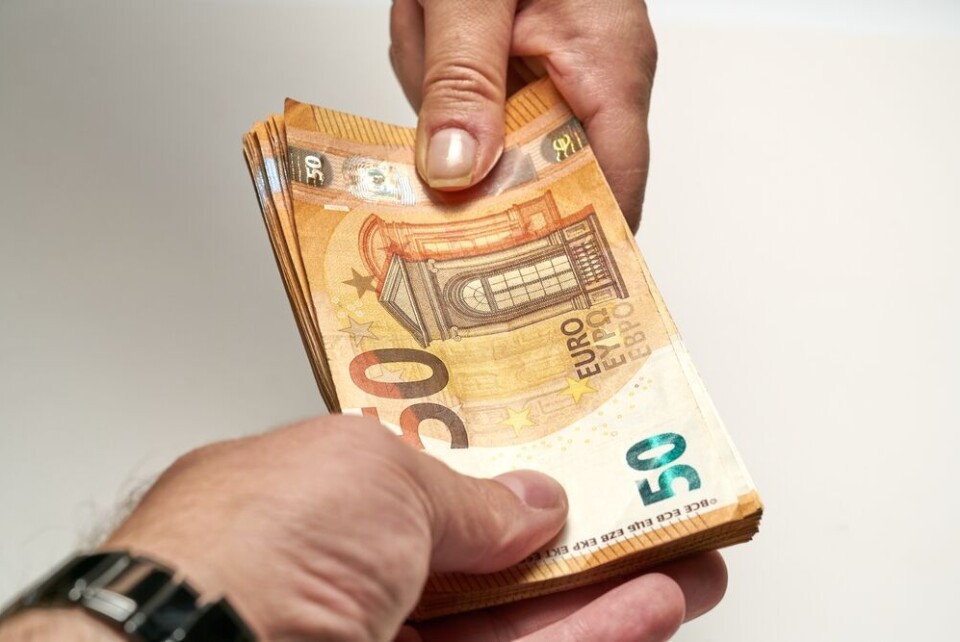-
VPN providers may leave France under pressure from Canal+
The broadcaster is demanding courts order Virtual Private Networks to block access to illegal streams
-
Forgetting luggage on French transport can land you a hefty fine
Fines vary from €72 to €1,500 depending on the level of offence, with 360 items left per week
-
Death of Emile, 2: French prosecutor gives more details after grandparents released
There are several reasons that a third party is suspected of involvement in Emile’s death
Working ‘on the black’ costs France €10 billion a year
Undeclared income includes work done for cash only and ‘errors’ when declaring income

Workers ‘on the black’ or ‘black market’, who take only cash and/or do not declare their income for taxes completely, cost France an estimated €10 billion per year, new figures suggest.
‘Black market’ work may make some people think of undeclared cleaners, handymen, or casual workers, who ‘only work for cash’ and have no official paperwork. But it is even more widespread than this, the figures suggest.
The report by the Haut Conseil du financement de la protection sociale (HCFIPS) - published today (January 17) - is based on checks by social security collector Urssaf (Union de recouvrement des cotisations de Sécurité sociale et d'allocations familiales). Although these paused during the Covid crisis, they resumed in 2022.
Read more: Why is illegal work called ‘travail au noir’?
“Undeclared work represents a loss of revenue of between €6.4 billion and €8 billion net, and between €8 billion and €10.1 billion if extra pensions are also taken into account,” said Dominique Libault, president of the HCFIPS and former director of the Sécurité sociale.
Types of 'black market fraud'
The Urssaf categorises two kinds of black market ‘fraud’.
- The first is undeclared work, such as that done only for cash, which costs the country around €6.2 billion-7.8 billion in 2022.
- The second kind is seen in “errors” in income tax reporting, in which workers ‘forget’ to declare all of their earnings, as well as items wrongly declared as business expenses, bonuses, or benefits.
These figures are likely much less than the amount actually missing, said Mr Libault, as the black market’s ‘hidden’ nature makes it even more challenging to track.
"These figures are obtained on the basis of checks on known companies, and do not take into account, for example, the underground economy linked to drug trafficking,” he said.
Where and in which sectors?
Geographically, the Ile-de-France and southern regions (including the former Languedoc-Roussillon area, Provence-Alpes-Côte d'Azur, and Corsica) have fraud rates that are significantly higher than the national average.
The industries of construction, hotels and hospitality, and catering, are those that see the highest rates of undeclared income, the figures show, affecting even large companies rather than only individuals and sole traders.
The problem is also growing in the agricultural sector; with an estimated fraud rate of €345.7 million in tax contributions, and €200 million in base accounting checks.
However, ‘microentrepreneurs’ - self-employed people using gig economy apps - are most likely to have the highest levels of fraud or undeclared income, the report said. It estimated their rate of evaded contributions at 42% (or €174 million), rising to 62% for VTCs (driving platforms such as Uber) and 70% for food delivery platforms.
“The sums involved are smaller than for conventional businesses but given these high rates, they add up to significant amounts. The phenomenon of massive under-declaration is problematic," said Mr Libault.
“[These missing] contributions [would otherwise] be used to fund pensions, healthcare and unemployment.”
Ultimately, undeclared work costs the country billions in funds that could go towards improving the quality of life for millions, he said.
Ways to identify fraud
In a bid to reduce the issue, the HCFIPS has recommended the introduction of a ‘deduction’ system, in which these gig economy platforms would be required to declare the turnover generated by their workers, and deduct social security contributions in advance.
This recommendation was taken on board, and is now set to become compulsory in 2027.
Overall, the massive loss in social security payments in France is serious, as the sector’s deficit is set to grow to €11.2 billion this year, and to €17.5 billion in 2027, an amount that Mr Libault described as “unprecedented” outside of extraordinary circumstances (such as the pandemic).
Related articles
French tax office trials social media checks to detect fraud
How French tax officials are using AI to track fraud
France worst hit country in Europe for dark web bank card theft
























